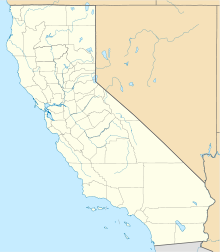Magnes Collection of Jewish Art and Life
 Location within California | |
| Established | 1961[2][3] |
|---|---|
| Location | 2121 Allston Way Berkeley, CA 94720 (United States) |
| Coordinates | 37°51′33″N 122°14′53″W / 37.8592°N 122.248°WCoordinates: 37°51′33″N 122°14′53″W / 37.8592°N 122.248°W |
| Type | Art museum, Jewish Heritage Museum[1] |
| Director | George W. Breslauer[4] |
| Curator | Francesco Spagnolo [5] |
| Website | http://magnes.berkeley.edu/ |
The Magnes Collection of Jewish Art and Life, formerly known as the Judah L. Magnes Museum from 1961 until its reopening in 2012,[6] is a museum of Jewish history, art, and culture in Berkeley, California. The museum, which was founded in 1961 by Seymour and Rebecca Fromer,[2] is named for Jewish activist Rabbi Judah L. Magnes, a native of Oakland and co-founder of the Hebrew University of Jerusalem. The Magnes Collection of Jewish Art and Life houses more than 30,000 Jewish artifacts and manuscripts, which is the third largest collection of its kind in the United States.[6]
During the 2000s, negotiations were held to potentially merge the Judah L. Magnes Museum with what is now called the Contemporary Jewish Museum of San Francisco.[3] However, the talks failed to produce an agreement to combine the two institutions.[3]
In 2010, the Judah L. Magnes Museum agreed to give its collection to the University of California, Berkeley, which will now display and preserve the museum's rare Jewish artifacts.[3] As part of the agreement, the collection was moved from its location in an 8,600-square-foot house on Russell Street in Berkeley to a 25,000-square-foot building on Allston Way in downtown Berkeley.[3] The Magnes Museum's board of directors had originally purchased the downtown building in 1997.[3]
The museum reopened in its new facility on January 22, 2012.[3] In addition to the move, the name of the museum was changed to the Magnes Collection of Jewish Art and Life.
Collections[]
The Magnes has a large collection of art and ritual objects and contains the Blumenthal Rare Book and Manuscript Library and Western Jewish History Center. The WJHC documents the history of the Jewish community in the thirteen western United States, with a special focus on the San Francisco Bay Area and has a large collection of original records, papers, correspondence, and photographs. The Center also contains copies of all of the Museum's publications and a detailed archive of its exhibition history.
Facilities[]
The space available for the museum has grown over time. Beginning as one room above the Parkway Movie Theater off Lake Merritt in downtown Oakland, the museum eventually expanded and relocated to the former Burke Mansion (architect: Daniel J. Patterson) in Berkeley. The museum's art and artifact collections are now located at 2121 Allston Way in Berkeley, while the Western Jewish Americana archives are held in the Bancroft Library at UC Berkeley.
Exhibitions[]
My America opened at the Magnes on June 5, 2006. The exhibit was on loan from the Jewish Museum in New York.
Known for promoting the avant-garde since its inception in the early sixties, the Magnes also launched the REVISIONS series of installations, including such artists as Ann Chamberlain, Naomie Kremer, Larry Abramson, Jonathon Keats, Amy Berk, and Shahrokh Yadegari, as guest-curated by Lawrence Rinder.
In September, 2007, They Called Me Mayer July: Painted Memories of Jewish Life in Poland Before the Holocaust opened at the Museum. Mayer July resulted from a collaboration between Barbara Kirshenblatt-Gimblett, a professor of performance studies and folklore at NYU, and her father, Mayer Kirshenblatt, who was born in Poland in 1916. With Barbara's encouragement, Mayer taught himself to paint as a septuagenarian and produced sixty-five paintings chronicling life in the Polish town of Opatów before the Holocaust.
History[]
Founded by Seymour and Rebecca Fromer, the Magnes Museum was dedicated to retrieving and preserving the art and artifacts of Jewish daily life, culture, and religion. Among the numerous artists and artisans whose careers and projects he helped launch and whose crafts he helped preserve:
Deborah Kaufman, who birthed the first Jewish Film Festival; Vivian Kleiman, a Peabody Award-winning producer of the first professional documentary film on the Jewish Diaspora (Routes of Exile: A Moroccan Jewish Odyssey); Lev Liberman and his band, the Klezmorim, the world's first Jewish Klezmer revival band; David Moss who revived the art of Hebrew calligraphy and contemporary Ketubah design; Victor Ries, a Jewish metalsmith and silversmith whose work includes the entrance gate to the original Magnes Museum property;
Among the projects that Seymour and Rebecca created: -cataloguing the treasure trove of Yiddish records salvaged from dumpsters; -collecting libraries of Yiddish books from the homes of Jewish chicken farmers in Petaluma, CA -retrieving Judaica poised to be discarded as Jewish life in various countries was diminishing, among them Morocco, Tunisia, Egypt, Czeckoslovakia, India, and Central Europe.
See also[]
- Yehuda L. Magnes
- Commission for the Preservation of Pioneer Jewish Cemeteries and Landmarks
References[]
Cited[]
- ^ Judah L. Magnes Museum: About, ARTINFO, 2008, retrieved 2008-07-30[permanent dead link]
- ^ Jump up to: a b Woo, Elaine (2009-11-08). "Seymour Fromer dies at 87; founder of Jewish museums". Los Angeles Times. Retrieved 2009-11-19.
- ^ Jump up to: a b c d e f g Baker, Kenneth (2012-01-23). "Magnes Collection of Jewish Art and Life reopens". San Francisco Chronicle. Retrieved 2012-01-30.
- ^ [1]
- ^ [2]
- ^ Jump up to: a b Rothstein, Edward (2012-01-22). "A Jewish Museum Shifts Identity". New York Times. Retrieved 2012-01-30.
More References[]
External links[]
- Art in the San Francisco Bay Area
- Art museums in California
- Education in Berkeley, California
- Institutions accredited by the American Alliance of Museums
- Jewish-American history in California
- Jewish museums in California
- Museums established in 1961
- Museums in Berkeley, California
- University museums in California
- University of California, Berkeley
